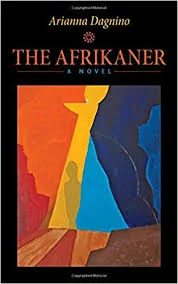Moving Forward, Standing Still: The Hubris of Public and Personal History in The Afrikaner by Arianna Dagnino
Publisher: Guernica Editions
Review: Hollay Ghadery
The Afrikaner by Arianna Dagnino is about as surprising as any contemporary post-colonial novel I could imagine. Though it's been many moons since I studied postcolonial literature during my undergraduate degree, I had an idea in my head about what this novel could be about: either a scathing condemnation of colonial power and abuses, or a narrative of apology for those abuses. The Akrikaner is neither. It's a tough trick to pull off. Acknowledgement, after all, is needed.
And it's given, but not by the book's omnipresent narrator, who loosely but adeptly juggles perspectives through dialogue, but never moralises on them. Rather, it's the characters who offer up their explanations, cry their abuses, make their apologies, and wrestle their demons. True to reality, every little hurt is not bandaged, and many of the injustices simply live on.
The novel is set in modern day South Africa and follows Zoe du Plessis, a palaeontologist of Dutch-colonial origins whose boyfriend and colleague, Dario, is gunned down in the streets of Johannesburg as the result of political tensions. In fact, this serenely violent scene opens the novel, and is the only part of the book that is not guided by Zoe's gaze. Instead, it's told in the first person, by Dario himself. A strange narrative choice, perhaps, but as the novel progresses and I learnt more and more about Zoe—someone prone to equal measures of emotional constipation and misdirected dramatics—this clarion exposure to the voice of Dario helps to situate the reader; makes it easier to see just how much weight we should put in the muddled thoughts of Zoe. Her ability to manage this subtle balance is a testament to Dagnino’s agility as a writer.
There's an impulse, I think, to try to clean up Zoe: everything from her opinion to her emotional and physical self seems to languish, and fade about the edges. Even though she can hardly sit still, leaving the university where she works to continue Dario's expedition in the relatively unpopulated and barren regions of the Kalahari Desert, she manages to maintain the stature of someone who is standing perfectly still; doing nothing. Getting nowhere. This suffocating immobility is echoed by Zoe's rereading of her Aunts’ diaries, which detail a family curse; a curse that says the first daughter of every daughter in the du Plessis family will never know lasting love, the person they love being doomed to die. It's a prophecy that Zoe, like her aunts before her, dismissed until the death of their lovers gave the curse credence. Zoe's mental and emotional inertia is frustrating to read. I admit that I found her almost as difficult to take as Hoda in Adele Wiseman’s Crackpot. Like the sluggish, brash Hoda, Zoe’s stagnancy is a fascinating reflection of the seeming impossibility of finding closure amidst the disparate beliefs and attitudes in post-colonial West Africa. It’s hard to forgive. It’s hard to forget. It can feel impossible to move forward.
But as Zoe learns when she discovers her brother is in love with a black man who will be taking over part of their family wine business; and as she learns when develops slow-burn, reluctant romantic feelings for a well-known writer who was imprisoned for his anti-apartheid beliefs, the world doesn’t stop for tragedy, no matter how great. Likewise, the human spirit can endure, if given room to breathe, heal and grow. Dagnino’s strange and beautiful writing provides the reader a safe space to negotiate their own way through the fraught, painful and fractured totality of the post-colonial experience toward a new understanding of literal and metaphorical spaces and places.



